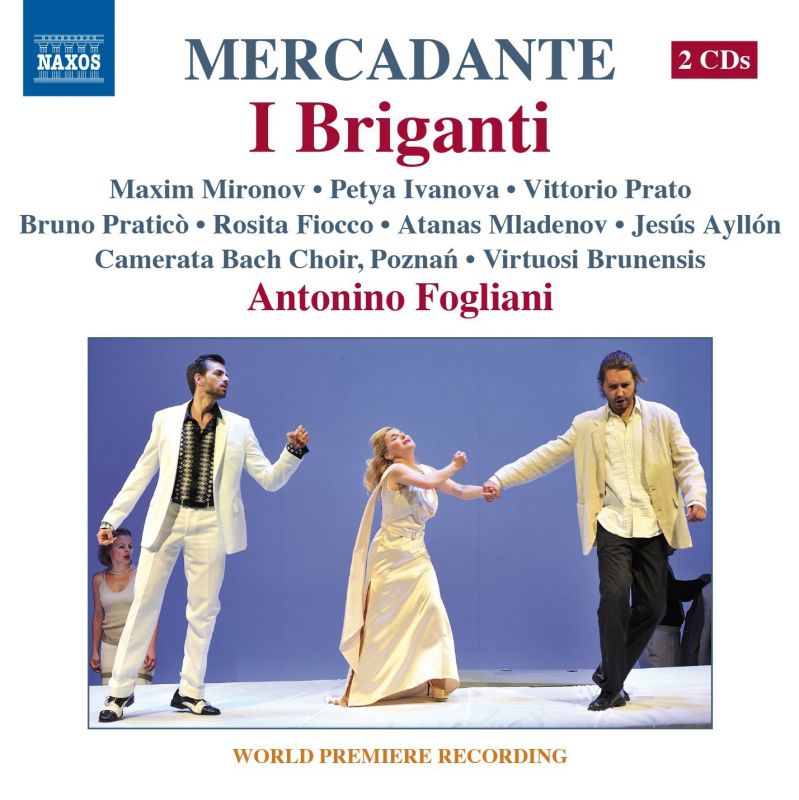MERCADANTE I Briganti
View record and artist detailsRecord and Artist Details
Composer or Director: (Giuseppe) Saverio (Raffaele) Mercadante
Genre:
Opera
Label: Naxos
Magazine Review Date: 10/2014
Media Format: CD or Download
Media Runtime: 137
Mastering:
DDD
Catalogue Number: 8 660343-44

Tracks:
| Composition | Artist Credit |
|---|---|
| I Briganti |
(Giuseppe) Saverio (Raffaele) Mercadante, Composer
(Giuseppe) Saverio (Raffaele) Mercadante, Composer Antonino Fogliani, Conductor Atanas Mladenov, Bertrando, Baritone Bruno Praticò, Massimiliano, Bass Camerata Bach Choir, Poznan Jesús Ayllon, Rollero, Tenor Maxim Mironov, Ermano, Tenor Petya Ivanova, Amelia, Soprano Rosita Fiocco, Teresa, Mezzo soprano Virtuosi Brunensis Vittorio Prato, Corrado, Bass |
Author: Richard Osborne
It’s often said that Mercadante was Italian opera’s link in the late 1830s between the recently retired Rossini and the young Verdi. This is doubtful. Verdi’s view of Mercadante was probably much the same as Chorley’s. Which isn’t to say that the occasional idea did not lodge itself in Verdi’s subconscious – witness brief premonitions of the opening of Otello in the storm chorus and drinking song which launch Part 2 of I briganti.
The role of the opera’s lead, dispossessed brigand Ermano, was written for the coloratura tenor Giovanni Battista Rubini, whom Rossini and his co-directors had recruited during that golden age between 1830 and 1836 when Paris’s Théâtre Italien was without peer in the operatic world. Two other bespoke roles were created for Rubini that same season, Arturo in Bellini’s I puritani and Fernando in Donizetti’s Marino Faliero. Other singers in the company included Grisi, Tamburini and Lablache, and it was for this stellar group – the so-called ‘Puritani quartet’ – that Mercadante also wrote I briganti.
This 2012 Wildbad theatre revival has the Russian tenor Maxim Mironov in the Rubini role, and very fine he is too. Baritone Vittorio Prato as the remorse-stricken ‘bad’ brother is more than adequate but it is the allure of Mironov’s singing which suggests how the ‘Puritani quartet’ must have helped lift Mercadante’s patchily written piece.
Mercadante is at his most distinctive when in gloomy mood (often throwing in a grieving cello for good measure). This melancholy tinta may have caught Verdi’s ear. What Mercadante generally lacks, alas, is Verdi’s ability to build and sustain momentum. Wildbad’s Music Director Antonino Fogliani does what he can.
The edition is based on manuscript copies by Florian Bauer, after researches by Michael Wittmann, who also provides the not entirely lucid track-by-track synopsis. I haven’t seen the edition and can’t say how complete (or, indeed, accurate) the performance is. Reading the Italian libretto, which is available as a download from Naxos, I would deduce that the opening chorus has been reduced by half. The recording is good, though there’s a good deal of stage noise in the final scene, not to mention a comically obtrusive wind machine in the storm chorus at the start of Part 2.
Discover the world's largest classical music catalogue with Presto Music.

Gramophone Digital Club
- Digital Edition
- Digital Archive
- Reviews Database
- Full website access
From £8.75 / month
Subscribe
Gramophone Full Club
- Print Edition
- Digital Edition
- Digital Archive
- Reviews Database
- Full website access
From £11.00 / month
Subscribe
If you are a library, university or other organisation that would be interested in an institutional subscription to Gramophone please click here for further information.




